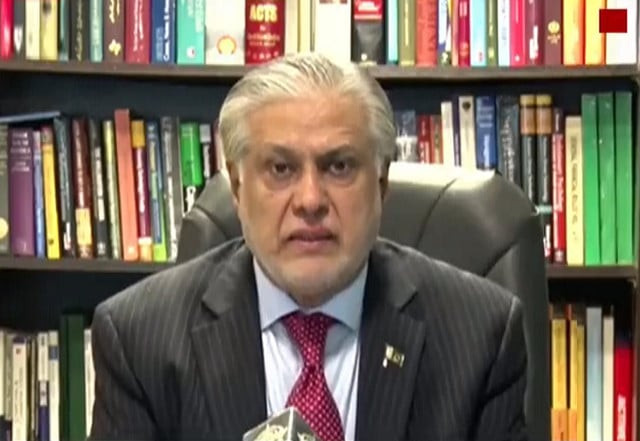$2.4b Chinese loan rollover announced
Move will make Pakistan’s debt sustainable in longer run

Pakistan on Thursday formally announced the $2.4 billion debt rescheduling by China -- a first move that might be followed by similar steps to make the country’s liabilities sustainable in the longer run.
Finance Minister Ishaq Dar tweeted that the Chinese EXIM Bank had rolled over for two years principal amounts of loans totalling $2.4 billion, which were due in the next two fiscal years.
Chinese EXIM Bank has rolled over for 2 years principal amounts of following loans totalling US$ 2.4 billion which are due in next 2 fiscal years:
— Ishaq Dar (@MIshaqDar50) July 27, 2023
FY2023-24: US$1.2 billion
FY2024-25: US$ 1.2 billion
Pakistan will make interest payments only in both years.
He added that in the current fiscal year, a principal amount of $1.2 billion would be rolled over.
The minister continued that another sum of $1.2 billion had been rolled over that was maturing in the fiscal year 2024-25.
“Pakistan will only make interest payments in both the years,” said Dar, whose name had constantly remained in the news this week for the position of the caretaker prime minister.
The Express Tribune reported last week that China had agreed to reschedule over $2 billion debt and the Economic Coordination Committee of the Cabinet approved these rollovers.
However, the announcement made by the finance minister is slightly different from the decision than the one that the ECC had endorsed on the basis of a summary moved by the economic affairs ministry in an emergency.
The ECC approved the rescheduling of 31 loans totalling around $2.1 billion, as there was one syndicate financing that did not qualify for the Chinese rollover.
The value of the $2.4 billion is for 32 loans.
Read Investment policy and way forward
The outstanding portfolio of the EXIM Bank of China is nearly $13 billion.
Out of this amount, $2.1 billion principal debt was maturing in the next two fiscal years.
After initially resisting the idea of debt rescheduling, Pakistan finally announced in June this year that it was open to loan rollovers with the bilateral creditors, excluding the Paris Club.
In its recent report, the International Monetary Fund (IMF) stated that elevated gross financing needs continued to pose high risks to Pakistan’s debt sustainability, particularly as its fiscal and reserve buffers had been depleted.
It added that timely disbursements of committed bilateral and multilateral support was critical in the period ahead.
The Washington-based lender continued in its report that higher interest rates, a larger-than-expected growth slowdown because of policy tightening, pressures on the exchange rate, renewed policy reversals, slower medium-term growth, and contingent liabilities related to state-owned enterprises posed significant risks to debt sustainability.
“The high share of short-term debt poses risks to debt sustainability and will require timely disbursements from these creditors”, the IMF noted.
The lender observed that risks to debt sustainability, already elevated at the time of the combined 7th-8th Extended Fund Facility reviews, had become more acute, given the scarcity of external financing and the large gross funding needs that persist over the coming years, further narrowing the path to feasibility.
Government officials said the economic affairs ministry had finalised an option of rearrangement of scheduled payments of 32 loans, which included guaranteed and the central debt totalling $2.4 billion.
These payments were due between the period of July 2023 and June 2025.



















COMMENTS
Comments are moderated and generally will be posted if they are on-topic and not abusive.
For more information, please see our Comments FAQ